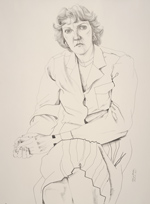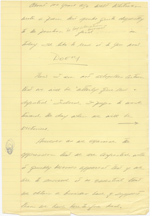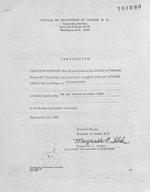The Stage
1970s: Gay Liberation and Lesbian Feminism (cont’d)
Electoral Politics
Drag performer José Sarria became the first openly LGBT person to seek public office, running unsuccessfully in 1960 for the San Francisco Board of Supervisors. Others followed, including Franklin Kameny, who ran in 1971 for the District of Columbia’s nonvoting seat in the House of Representatives, and Jim Owles, who ran for a New York City Council seat.
Elaine Noble won a seat in the Massachusetts House of Representatives in 1974. As the first openly LGBT candidate to win a state level election, she began a new era in electoral politics.
Other candidates came out while in office, and increasing numbers of openly LGBT candidates were elected, including Harvey Milk to the San Francisco Board of Supervisors in 1977. His assassination in 1978 galvanized the gay movement. The first successful African-American LGBT candidate was Sherry Harris, elected to Seattle’s City Council in 1991.
 |
Don Bachardy. Portrait of Elaine Noble. Mariposa portrait series. Human Sexuality Collection. [zoom] |
In 1972, James Foster was the first openly gay delegate to address a national political party convention. The Human Sexuality Collection includes his hand-written notes for that speech. It begins, “About 100 years ago Walt Whitman wrote a poem that speaks quite eloquently to the position the Gay Liberation Movement finds [itself] in today.”
 |
Democratic National Convention Speech, 1972. James Foster papers. Human Sexuality Collection. [zoom] |
The Gay Rights National Lobby (GRNL) formed in 1976 to lobby at the federal level for civil rights and other federal legislation pertinent to gay people.
 |
“GRNL Certificate of Incorporation,” 1976. Human Sexuality Collection. [zoom] |